Commenting on the mid-term 1 Literature test for grade 10 in Ho Chi Minh City with the requirement to analyze the "popular lifestyle" of today's youth, teachers said that the use of slang can cause students to misunderstand or be inaccurate about the nature of language.
Comments on midterm 1 Literature test for grade 10 in Ho Chi Minh City
Regarding the Literature exam question mentioning "canvas lifestyle", after creating controversy on social networks, on October 30, Mac Dinh Chi High School, District 6, Ho Chi Minh City, confirmed: This is the mid-term 1 Literature exam for students of class 10A25 of the school, not for all students of grade 10.
According to the assignment, in 45 minutes, students will write an essay discussing "The current lifestyle of young people". This test is very special because there is only one line on an A4 page with the note: "Students are not allowed to use documents. The invigilator will not explain anything further".
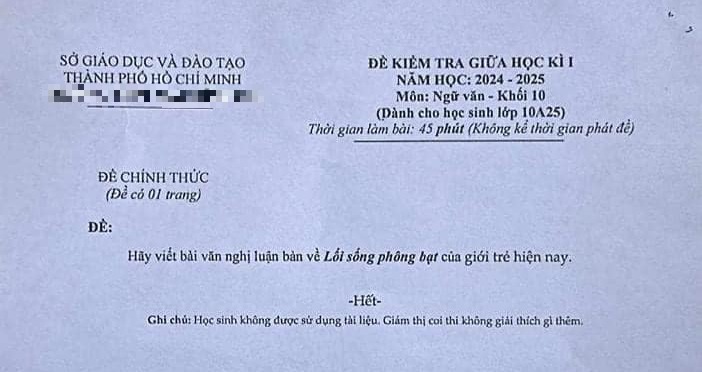
The mid-term 1 Literature test for grade 10 in Ho Chi Minh City caused controversy. Photo: CMH
Talking to Dan Viet newspaper reporter, Master of Linguistics Nguyen Mong Tuyen, Literature teacher at Trung Phu High School, Cu Chi district, Ho Chi Minh City, commented: " The test is new, concise, and focused. With the format of the test having only one question, the test maker wants to guide students to focus on analyzing and presenting their opinions.
The topic is highly practical. The topic "the current lifestyle of young people" is an issue that is of concern to the whole society. The difficulty is that in order to express their point of view, students need to pay attention to real life, not just learn from books. The topic is open-ended, with questions without specific answers, creating conditions for students to demonstrate their ability to think independently and creatively.
However, the question may also be controversial. The concept of "canvas lifestyle" can be understood in many different ways, easily causing controversy during the scoring process. And it is worth mentioning that the question is not yet meeting the requirements of comprehensively testing students' abilities: Although the way we ask questions like this has the positive factors mentioned, it will be very difficult to assess students' abilities.
Teachers should prepare a question according to a matrix, from recognition - understanding - application - high application, so as not to confuse students. It is also possible that when the teacher bases the question on the academic performance of the students in the class (mostly good students), he has a special way of creating questions like that. Anyway, I still respect my colleagues' way of thinking and creativity."
Should we use slang in exams?
According to Master Tuyen, the use of slang, especially "trendy" words in exams can bring closeness and attraction to students, because it partly reflects modern language life. However, slang is temporary and changes over time. Putting these words in exams, an environment that requires orthodoxy and standards, can cause students to misunderstand or be inaccurate about the nature of language.
Furthermore, the test must beeducational , helping students to access a more stable and long-term language foundation, instead of chasing after the moment. We need to maintain a balance, select carefully or have clear annotations, so that students can feel the newness but not lose the core value of the language.
The Literature exam questions under the new curriculum currently have many bright spots, demonstrating the spirit of reform and the desire to bring education closer to social reality. The exam questions not only test knowledge but also aim to assess students' comprehensive abilities. However, in the transition process, there are still some points that are not really smooth. The application of new requirements sometimes creates pressure for both students and teachers, especially in areas where there is a lack of synchronization in teaching and testing methods. The completion and synchronization of the question-making method requires professionals and strategic planners to have more in-depth dialogues and discussions to minimize the difference between the questions."
Dr. Le Thi Thuy Vinh, Faculty of Literature, Hanoi National University of Education 2, commented: "Phong tarpaulin" is a slang word used by the social network community in recent times. This slang word refers to the act of showing off, embellishing when in reality it is not real or there is not much. From specific actions, we have a "phong tarpaulin" lifestyle (a lifestyle that prefers formality but is not genuine), "phong tarpaulin" people (people who like to show off by exaggerating their assets, their ability to hide their true nature).
The midterm exam for grade 10 raised the issue of "canvas lifestyle" and asked students to present their opinions on this lifestyle. In terms of discussion, the exam raised a "prominent" and urgent issue for young people. In terms of the compatibility of the discussion topic and the characteristics of an exam for students, it is completely inappropriate. Because slang is a word with a limited scope of use. Therefore, in principle, people only use slang in certain scopes and for certain subjects. The exam for students is a text aimed at the majority of readers, so the use of slang is unreasonable (if used, there must be specific contexts so that students can understand correctly).
Based on the test specification matrix, it can be seen that the Literature test questions in the new program currently all have a "territory" for social commentary in addition to the familiar literary commentary. Requiring candidates to present their opinions on social commentary issues will help candidates practice their presentation skills, evaluate right/wrong, and present their correct viewpoints. At the same time, candidates also need to accumulate social knowledge through reading books, newspapers, the internet, etc. This also helps avoid rote learning, and enhances learners' thinking and reasoning abilities."
Source: https://danviet.vn/tu-de-kiem-tra-van-lop-10-o-tphcm-ve-loi-song-phong-bat-gay-xon-xao-co-nen-chay-theo-trend-dung-tieng-long-2024103106070741.htm


























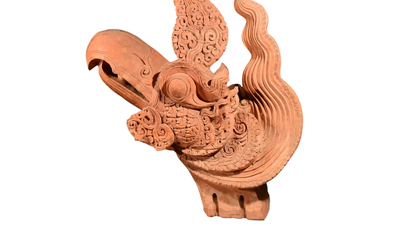























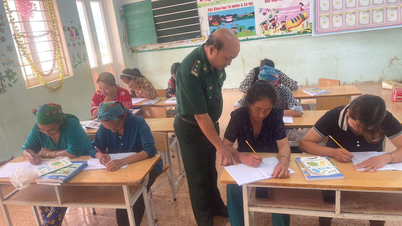









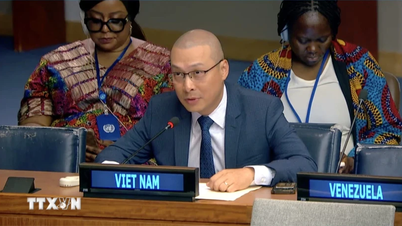



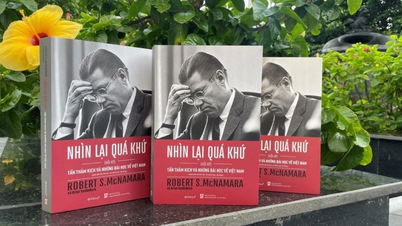










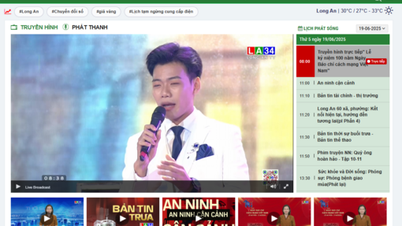






















Comment (0)